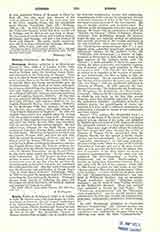

Stevenson, JOSEPH, archivist, b. at Berwick-on-Tweed, November 27, 1806; d. in London, February 8, 1895. Though his parents were Presbyterians, he was educated at Durham under the historian, James Raine, and afterwards at the University of Glasgow. Coming to London he found work, first among the Government records, then in the British Museum, 1831; later he married Mary Ann Craig, and gradually gave up Presbyterianism. The death of his eldest and much-loved son so affected him that he returned to Durham and took Anglican orders. He became librarian at the cathedral (1841-48), and was afterwards instituted rector of Leighton Buzzard (1849-63). All this time he was constantly editing ancient texts: for the Maitland Club, Glasgow, eight volumes (1833-42); for the English Historical Society, five volumes (1838-41); for the Roxburghe Club, four volumes; for the Surtees Society, seven volumes, with eight volumes of “The Church Historians of England.” In 1856 the English Government was making plans for dealing with the national records on a large scale. Stevenson was one of those appointed to report on the subject, and when the Public Record Office was instituted, 1857, he was one of the first editors engaged. He now edited seven volumes for the Rolls Series, seven volumes of Calendars, Foreign Series, and two of the Scottish Series. Meantime he had been received into the Church, June 24, 1863, and after his wife died, 1869, he entered the seminary of Oscott, and was ordained priest by Bishop Ullathorne in 1872. Next year he was in Rome searching for documents concerning English history from the Vatican archives, being employed by the British Government to begin the series of “Roman Transcripts” for the Record Office; he also wrote many reports for the Historical Manuscript Commission. In 1877 he gave up these occupations to enter the Society of Jesus, though nearly seventy-two years of age, but after his novitiate he returned again to historical research, and continued his studies until the end. His chief work of this period was the discovery and publication of Claude Nau’s “Life of Mary Queen of Scotts” (Edinburgh, 1883). In 1892 he received the honorary degree of Doctor of Laws from the University of St. Andrews. Prolonged literary work, instead of stiffening the mind, left Stevenson ever fresh and elastic, the friend of children and prodigal of kindness to others.
J. H. POLLEN

